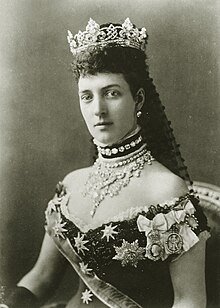Alexandra of Denmark
| Alexandra of Denmark | |||||
|---|---|---|---|---|---|

Photograph by Alexander Bassano, 1881
|
|||||
| Tenure | 22 January 1901 – 6 May 1910 | ||||
| Coronation | 9 August 1902 | ||||
| Born |
1 December 1844 Yellow Palace, Copenhagen, Denmark |
||||
| Died | 20 November 1925 (aged 80) Sandringham House, Norfolk |
||||
| Burial | 28 November 1925 St George's Chapel, Windsor Castle |
||||
| Spouse | Edward VII (m. 1863; d. 1910) | ||||
| Issue |
|
||||
|
|||||
| House | Schleswig-Holstein-Sonderburg-Glücksburg | ||||
| Father | Christian IX of Denmark | ||||
| Mother | Louise of Hesse-Kassel | ||||
| Religion | Lutheran; Anglican upon marriage | ||||
| Full name | |
|---|---|
| Alexandra Caroline Marie Charlotte Louise Julia |
Alexandra of Denmark (Alexandra Caroline Marie Charlotte Louise Julia; 1 December 1844 – 20 November 1925) was Queen of the United Kingdom of Great Britain and Ireland and Empress of India as the wife of King-Emperor Edward VII.
Her family had been relatively obscure until 1852, when her father, Prince Christian of Schleswig-Holstein-Sonderburg-Glücksburg, was chosen with the consent of the great powers to succeed his distant cousin, Frederick VII, to the Danish throne. At the age of sixteen, she was chosen as the future wife of Albert Edward, Prince of Wales, the heir apparent of Queen Victoria. They married eighteen months later in 1863, the same year her father became king of Denmark as Christian IX and her brother was appointed to the vacant Greek throne as George I. She was Princess of Wales from 1863 to 1901, the longest anyone has ever held that title, and became generally popular; her style of dress and bearing were copied by fashion-conscious women. Largely excluded from wielding any political power, she unsuccessfully attempted to sway the opinion of British ministers and her husband's family to favour Greek and Danish interests. Her public duties were restricted to uncontroversial involvement in charitable work.
On the death of Queen Victoria in 1901, Albert Edward became king-emperor as Edward VII, with Alexandra as queen-empress. She held the status until Edward's death in 1910. She greatly distrusted her nephew, German Emperor Wilhelm II, and supported her son during World War I, in which Britain and its allies fought Germany.
Princess Alexandra Caroline Marie Charlotte Louise Julia, or "Alix", as her immediate family knew her, was born at the Yellow Palace, an 18th-century town house at 18 Amaliegade, right next to the Amalienborg Palace complex in Copenhagen. Her father was Prince Christian of Schleswig-Holstein-Sonderburg-Glücksburg and her mother was Princess Louise of Hesse-Kassel. Although she was of royal blood, her family lived a comparatively normal life. They did not possess great wealth; her father's income from an army commission was about £800 per year and their house was a rent-free grace and favour property. Occasionally, Hans Christian Andersen was invited to call and tell the children stories before bedtime.
...
Wikipedia
